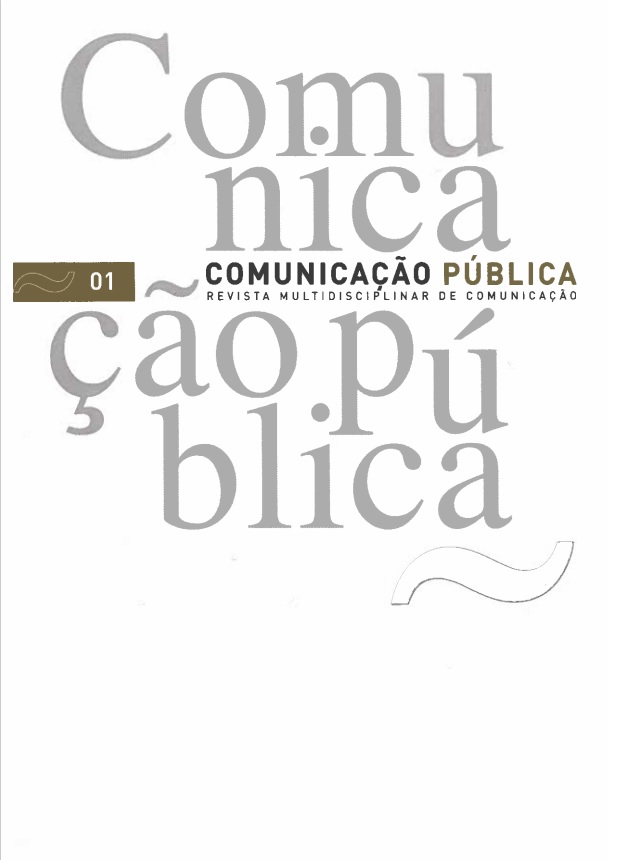Organizational communication
in search of autonomy
DOI:
https://doi.org/10.4000/cp.10038Keywords:
communication, organizationAbstract
In this article we study the organizational communication field trying to identify the several moments that lead this area to an autonomous scientific discipline. At the same time we reflect upon the difficulties of working in a matter that has its roots in several social sciences disciplines, witch makes difficult its recognition in the academic arena.
Due to the non consensual definition of the organizational communication concept we present diverse interpretations in an attempt to clarify future fittings. Finally, we focus on several approaches that support the study of the organization communication field, the most interesting themes, the theories that sustain its research and the various dimensions of that research.
Downloads
References
Bardin, L. (1977) Análise de conteúdo. Lisboa, Edições 70.
Baker, K. A. (2002) Organizational communication, cap. 13. [Internet] Disponível em www.sc.doe.gov/sc-5/benchmar/Ch%201320 Organizational%20 Communication%2006.08.02.pdf [Consult.14 de Março 2004].
Bartoli, A. (1991) Communication et organisation – pour une politique générale cohérente. Paris, Les Éditions d’Organisation.
Bertrand, Y. & Guillemet, P. (1994) Organizações: uma abordagem sistémica. Lisboa, Instituto Piaget.
Breton, P. (1994) A utopia da comunicação. Lisboa, Instituto Piaget.
Breton, P. & Proulx, S. (1997) A explosão da comunicação. Lisboa, Editorial Bizâncio.
Caetano, E. (2000) Dominique Wolton: os furos da rede. Visão, 27 de Abril, pp. 13-15.
Corman, S. R. [et al.] eds. (1995) Foundations of organizational communication. 2nd edition, New York, Longman.
Crozier, M. (1963) O fenómeno burocrático. Brasília, Editora Universidade de Brasília.
Crozier, M. (1994) A empresa à escuta. Lisboa, Instituto Piaget.
Deetz, S. (2001) Conceptual foundations. In Jablin, F. M. & Putnam, L. L. eds. The new handbook of organizational communication: advances in theory, research and methods. London, Sage Publications, pp. 3-46.
Eisenberg, E. & Goodall, H. L. (1997) Organizational communication. 2nd edition, Boston, St.Martin’s Press.
Ferreira, J. M. C. [et al.] (1996) Psicossociologia das organizações. Lisboa, McGraw-Hill Portugal.
Ferreira, J. M. C. [et al.] (2001). Manual de psicossociologia das organizações. Lisboa, McGraw-Hill Portugal.
Freire, J. (1998) Empresas e organizações: mudanças e modernização. In Viegas, J. M. L. & Costa, A. F. eds. Portugal – que modernidade? Oeiras, Edições Celta, pp. 285-309.
Friedberg, E. (1993) O poder e a regra: dinâmicas da acção organizada. Lisboa, Instituto Piaget.
Griffin, E. (1997) A first look at communication theory. 3rd edition, New York, McGraw-Hill.
Grunig, J. ed. (1992) Excellence in public relations and communications management. London, Laurence Erlburn Associates. DOI: https://doi.org/10.4324/9780203812303
Jablin, F. M. & Putnam, L. L. eds. (1987) Handbook of organizational communication – an interdisciplinary perspective. London, Sage Publications.
Jablin, F. M. & Putnam, L. L. eds. (2001). The new handbook of organizational communication: advances in theory, research and methods. London, Sage Publications.
L’Etang, J. (1998) Critical perspectives in public relations. London, International Thomson Business Press.
Littlejohn, S. W. (1999) Theories of human communication. 6th edition, Belmont, Wadsworth.
Miège, B. (1995) La pensée communicationnelle. Grenoble, Presses Universitaires de Grenoble.
Miller, K. (1999) Organizational communication – approaches and processes. 2nd edition,Wadsworth Publishing Company.
Milon, A. & Jouve, M. (1994) Communication et organisation des entreprises – approche critique et cas pratiques. 3ª ed., Paris, Bréal Editions.
Mintzberg, H. (1995) Estrutura e dinâmica das organizações. Lisboa, Publicações Dom Quixote.
More, E. A. & Laird, R. K. (1985) Organisations in the communications AGE – An introduction to organisational communication and communication technology for management. Sydney, Pergamon Press.
Mucchielli, A. (1998) Approche systémique et communicationnelle des organisations. Paris, Armand Colin.
Orgogozo, Isabelle (1998) L’entreprise communicante. Paris, Les Éditions d’Organisation.
Pace, R. W. & Faules, D. F. (1994) Organizational Communication. 3rd edition. New Jersey,Prentice-Hall.
Pereira, S. (2001) O poder das redes ou as redes do poder? – análise estratégica numa organização com Intranet. [Texto policopiado] Tese de Mestrado em Comunicação, Cultura e Tecnologias de Informação, Instituto Superior de Ciências do Trabalho e da Empresa.
Peters, T. & Waterman, B. (1995) Na senda da excelência. 3ª edição, Lisboa, Publicações Dom Quixote.
Ruão, T. (Abril, 2004) O estado da arte em comunicação organizacional. 1900-2000: um século de investigação. Comunicação apresentada no VI Congresso Lusófono de Ciências da Comunicação, Covilhã.
Salwen, Michael B. & Stacks, Don W. (1996) An integrated approach to communication theory and research. New Jersey, Lawrence Erlbaum Associates.
Sfez, L. (1993) Dictionnaire critique de la communication. Vol. I, Paris, Presses Universitaires de France.
Taylor, J. R. (1993) Rethinking the theory of organizational communications: how to read an organization. New Jersey, Ablex Publishing.
Thayer, L. & Barnett, G. A. eds. (1994) Organization – communication. New Jersey, Ablex Publishing.
Toffler, A. (1992) Os novos poderes. Lisboa, Círculo de Leitores.
Westphalen, M.-H. (s.d.) A comunicação na empresa. Porto, Rés Editora.
Published
Issue
Section
License
Copyright (c) 2005 Direitos de Autor (c) 2005

This work is licensed under a Creative Commons Attribution-NonCommercial 4.0 International License.
Os conteúdos da Comunicação Pública estão licenciados com uma licença Creative Commons - Atribuição-NãoComercial 4.0 Internacional.


